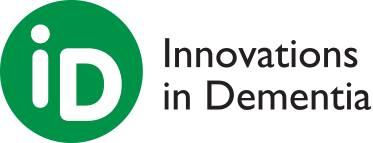
Partnerships
Much of our work is carried out (and can only be carried out) in partnership with other organisations. These might for example be Universities, local authorities, health bodies, film-makers or other third sector organisations. Such collaborations give us – and the people with dementia we work alongside – a much better chance of reaching and influencing others.
On this page we highlight several of our key partnerships, and host some of the resources we have produced through them.
One Dementia Voice
One Dementia Voice is a collaboration of a number of organisations driving change in dementia support in the UK. Together we are building links between our activities, promoting the rights of people living with this long-term condition, and making sure people affected by dementia have the strongest possible voice with decision makers.
The organisations are:
Alzheimer’s Research UK
Alzheimer’s Society
Dementia UK
Innovations in Dementia
John’s Campaign
Lewy Body Society
Rare Dementia Support
Together in Dementia Everyday (tide)
Young Dementia Network
One of the first collaborations has been on ‘Dementia, Disability and Hope.’ Our shared vision is that:
By proactively addressing the societal and environmental barriers which disable people affected by dementia – and by not focusing only on the disease – we can and should all play our part in bringing more hope and meaning to their lives.
In Spring 2022, we produced a resource which is currently being tested internally by each of the organisations. Later in the year we plan to launch the initiative to a much wider audience, and to encourage others to take the approach on board.
Alongside the booklet, we have also produced seven short YouTube films featuring a number of experts, including people with dementia and carers:
Film 1: People with dementia discuss what this approach means to them (15 mins)
Film 2: Carers discuss the relevance of information about rights to support their requests for better support (11 mins)
Film 3: Prof. Tom Shakespeare, sociologist, bioethicist and disabled person, sets dementia in the context of the disability rights movement (21 mins)
Film 4: Neil Crowther, independent expert on equality, human rights and social change, and former carer for his father, explains the relevance of the social model to dementia (20 mins)
Film 5: Toby Williamson, social care consultant and rights expert, talks about equality and changing the narrative of dementia (20 mins)
Film 6: Sam Cox, Knowledge Officer for Legal and Welfare Rights at Alzheimer’s Society, explains why it’s important to be aware of and use the law (11 mins)
Film 7: Grainne McGettrick, Research and Policy Manager at Acquired Brain Injury, Ireland (and previously at the Alzheimer Society of Ireland), reflects on the importance of human rights and capacity law for people with dementia (19 mins)
East Riding of Yorkshire Partnership
Since 2020 we have worked with commissioners from Public Health, East Riding CCG, the Humber NHS trust, and the East Riding of Yorkshire local authority to build a new approach to dementia care services across rural east Yorkshire.
The collaboration introduces a powerful co-production element. We have co-created a series of ‘Good Life With Dementia’ courses. This is a post diagnostic information programme FOR people with dementia designed and delivered BY people living with dementia. The programme has not only created of a post diagnostic resource pack that really hits the mark, it has also led to the establishment of a new group of peers living with dementia, now part of DEEP the UK network of dementia voices. With further courses planned we have started to establish a growing network of peers across the county who can play a relevant and important role and helping shape local dementia services in the future. You can watch a 5-minute video about the Good Life With Dementia course below.
The 4 agencies have also jointly commissioned training to equip a new cohort of community-based health and well-being coaches as facilitators of the Getting Along programme. Getting Along is a relationship-centred approach that supports couples of any type to adjust to the change in the dynamic of the relationship brought on by the presence of a dementia. We are introducing a large ‘self-management’ element to that uncertain period in and around the time of diagnosis to help families avoid a lot of the ‘traps’ that dementia sets within a relationship. We have another 5-minute video explaining Getting Along below.
As well as delivering the training we have remained in dialogue to help embed these new approaches and have:
- provided shadowing opportunities for facilitators of both programmes.
- joined the East Riding dementia collaborative
- supported ongoing facilitation of the emerging peer group – the East Riders
- provided group supervision sessions for the new Getting Along facilitators.
REACH team – University of Exeter
We have collaborated with the REACH team on a number of dementia research projects, bringing in the perspectives of people with dementia and ensuring their involvement in shaping and guiding research. We lead Patient and Public Involvement (PPI) for ENLIVEN, IDEAL and the GREAT-IP project. As part of the GREAT-IP project, we supported the co-production of a self-management resource for people with dementia called My Life, My Goals.
We also run an Exeter-based research involvement group of people with dementia and carers. This is a group that dementia researchers can meet with to discuss their research ideas and gain feedback and advice.
REACH stands for Research in Ageing and Cognitive Health. It is part of the University of Exeter Medical School. Its aim is to conduct research that helps to improve the lives of people with dementia and their care partners.
